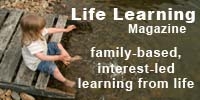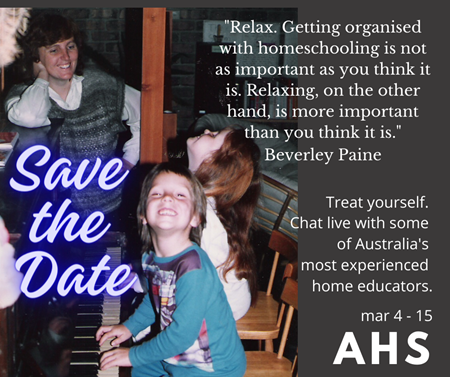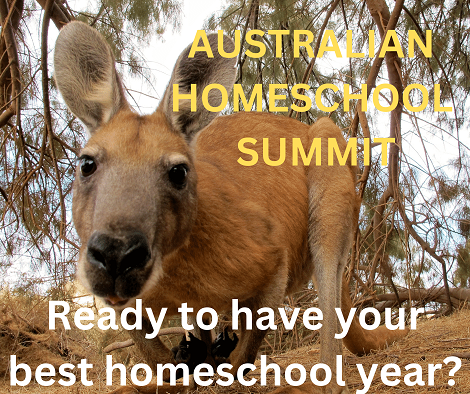|
Expectations, Structure and Difficulty - questions about natural learning
by Beverley Paine, Nov 2009
Recently a home educating parent asked me a few questions about natural learning:
Q: "What expectations to you explain to your kids in terms of what you would like them to `do' in a day. Is it all just one big holiday, or do you say `let's produce....a scrap book. a diary, a maths concept?"
My concept of natural learning is that we are all learning, all the time and can't stop ourselves. We each learn in different ways - this was a hard lesson for me to learn so I'll harp on about it a bit!
I used to dismiss how other people learn, thinking that they weren't learning at all because they weren't learning the same way I did. My husband, for example, seems to have no awareness of the learning process. He gets stressed and confused if I ask him to talk about how he learns something. If I go on about it enough, he gets demoralised and thinks there is something wrong with him... However, he's brilliant, successful, productive, knowledgeable. It's just that he doesn't self-reflect in the same obvious way I do.
My daughter used to calculate sums in her head, even complex ones. I insisted she do the working out on paper, so I could see where the 'mistakes' were being made, and also because the school books said this was the best way to learn maths. My brilliant mathematically minded daughter stopped loving maths at age 9 and even now, as an adult, doesn't think she's good at maths, even though she's a natural. I can't do maths without using pen and paper. By forcing my learning methods on my daughter I undermined her confidence as a mathematician (not her skill).
What's my point? Do some research on the internet about learning styles. Work out your own learning style, then work out your children's. Don't stick them on yourself or children as labels, but realise that the aim is to build on strengths, recognise and work with limitations (some people call them weaknesses but I don't like that term). Look at the holistic picture, but don't aim for a perfectly rounded child good at everything.
The easiest way for me to do this was to devise a list of THE most important things a child must do each day. My natural learning checklist has things on it like 'giggle', 'run, hop, skip', 'dream' - things that simply sum up activities that we all need to do each day to be healthy and happy individuals living together. When I go for a walk (being physical) I day dream (imagination/creativity) and plan (problem solving). Walking helps my brain do all these things better.
What do I want my children to 'do' in a day? First of all, 'be' themselves. Then I want them to be responsive to the needs each day naturally brings. We all work to do that is essential and important. This work - the daily chores of living - teaches so much that is otherwise packed into school curricula in rather meaningless ways. By simply living your children have easily and naturally learned at least half of the school curriculum!
So make sure that being involved in the humdrum of family and community life is an important part of your daily schedule. Involve them and include them. Be their mentor and tutor. Let them be your apprentices.
If there is any time left over, which there should be, play.
Play is a huge topic and can be almost anything. In our home I coined the phrase - "we work at play and play at work". When we worked, we worked playfully. When we played, we played workfully. We learn when we work and we learn when we play.
I wasn't overly fond of the 'fun' distinction society places on play, or the push to make education 'fun'. Learning isn't fun, it's learning. It can be easy or hard, fun or a drag. We don't learn because it is easy or fun, we learn because we need to learn - learning is a part of growing and we all need to grow. Children learn in all sorts of ways and don't really care how (until we teach them that it is hard, boring, that they can 'fail' at it, that it needs to be fun, etc).
To determine what I would like my children to do in a day I worked out what was important to me for them to learn. And we'd do that. For instance, if I felt that drawing was important (and it is, for dozens of reasons!), I would set aside some time in MY day to sketch. I'd head into the garden or sit on the floor with lots of pencils and all the sketch books and draw. In no time I'd have three children drawing beside me. Unless, of course, they had a far better game going.
If I had to clean the bathrooms I'd ask them to help. If I was cooking dinner I asked them to help. They hung out the washing, collected the firewood, set the fire, fed the animals, helped in the garden, helped us make furniture, etc. And we played LEGO, dress ups, board games, hide'n'seek, etc with them. We also had plenty of time where we did our own things, uninterrupted.
All in all it was a very busy productive life!
I guess what I'm saying is that I definitely had expectations of my children. We would talk about them, work out how realistic and reasonable they were. Sometimes I would moderate my expectations and sometimes the children would have to moderate their expectations. We did a lot of negotiating!
Recording what we do and how we did it as learners helps us to not only see the learning processes at work (and thus realise what wonderfully effective natural learners we are!), but also produce the evidence we all seem to require that we are actually learning something. Children don't need this proof - they move from one thing to the next quite happily. But us adults need this proof - we've been conditioned by our schooling and cultural heritage to feel insecure without it.
Recording also offers lots of opportunities to learn really valuable skills. The scientific method depends on recording, so keeping scrapbooks or taking photos, or writing on calendars, developing charts, keeping diaries, etc naturally teaches our children how to think scientifically!
Let go of the way schools divide learning into discrete subjects as the only way to learn and mix it up. Realise that when you child is asked to cut the cake into eight equal pieces she is dividing and learning equivalent fractions. Realise that when she scoring in a game of cards or dice she is doing maths. Keep life 'real' but in your head and in your homeschooling diary record what your children are doing in the curriculum subject areas. This will help build your confidence and reassure you that learning naturally is an effective curriculum.
Q: "Am I still expecting to much?"
If you are comparing your child to a schooled child and expecting them to do the same, learn the same and be the same, then yes. The answer to that is 'stop comparing'. What is the point of the comparison? Create your own list of goals and objectives, keep records that are meaningful to you and your children, and assess them on their progress, rather than some arbitrary 'outcome' determined by strangers.
Q: "Is some structure good?"
Life at home is incredibly structured. We all have routines and structures that we follow. There are things that need to be done by set times every day and every week. Go with those structures - they are definitely good!
Learn to recognise the arbitrary structures that don't make sense in your life and your children's lives. Needing to do something to please someone else, or to finish a page, or a book or whatever, might not make sense. Be flexible and adaptive. Negotiate. Some things are important to me, some things are important to my child. I give a little, he gives a little. We aim for win-win which means we are ultimately happy with whatever compromise we devise.
I gave up the idea of having a spotless house that would look good in a magazine to spend more time playing with my children. My son thought this was a good idea because, as he put it, "I can't see the mess, don't know what you are talking about." Making him clean up a mess he couldn't 'see' didn't make much sense to him. By the time he was in his early teens his rooms was kept tidy and relatively clean. His approach worked. Before I moderated mine, it produced stress and tears.
What had happened was that we'd both recognised that a tidy and organised space means it is easier to do what we want to do each day. That's natural learning. Icky isn't pleasant, clean is pleasant. We learned to do what was necessary to enjoy life - for us - not to please others (unless we wanted to - for example, my children would often clean the house as a 'gift' for me, especially on my birthday).
Educational structure? Sometimes it is easier to learn things in a sequential manner. Sometimes it is easy to learn something from a book or a workshop or regular class. No one questions learning karate in a structured way. Use structure if it makes sense.
Q: "Is letting them only do what they like teaching them to avoid anything `too hard' or as my 4 year old said when I was running through sums, traveling in the car...`only give me the easy ones that I know'!"
From birth children have been naturally tackling things that are too hard. I am amazed at how toddlers can lift their weight - no way can I do that! It's too hard for me. Yet no one says to me that I ought to be able to do it, that if I don't I'm 'avoiding' it, or worse still, will become lazy and spoiled!
Children want to do things that are difficult and too hard. We teach them how not to - "don't touch that, it will hurt you, you will break it, you're too small, etc". By the time they are seven or eight, especially if they have been too school, they know that simply being in the world, as a naturally curious inquisitive being, is 'wrong' and leads to trouble... Oh boy, how sad is that?
Children don't like to perform for performance sake, yet adults insist that they do. We need to see that they can 'do' something, that they've learned it. They can't see what the fuss is all about (unless we've trained them to perform). Children will often practice a skill in private and then suddenly appear able to do it. Or they will simply learn it naturally without practice, by observing others doing it. We've all seen moments like this in our children's lives.
As an adult I only want to be given 'the easy sums'. Doing stuff that is easy helps build my confidence. I know when I am ready to tackle the hard stuff. And when I am, I happily tackle it. I am usually in a state of excitement and fully immersed in the task when I'm challenging myself with something hard and new. Children are the same. You can throw a 'hard one' at them any time of the day, but if they resist, recognise that they aren't ready yet, and help them. Work out the sum aloud. Don't teach, simply demonstrate. Don't expect an answer or response, simply say your bit and shut up. Understand that they are listening, but that's all that need to do. It's what you'd want from your friend and mentor, right? Some space to learn in your own way, in your own time...

Was this article helpful? Was it worth $1.00 to you?
Your gift of $1 or more helps to keep this site operating
offering encouragement
and reassurance to families
wanting
better outcomes for their children.



Beverley Paine with her children, and their home educated children, relaxing at home.
Together with the support of my family, my aim is to help parents educate their children in stress-free, nurturing environments. In addition to building and maintaing this website, I continue to create and manage local and national home educating networks, help to organise conferences and camps, as well as write for, edit and produce newsletters, resource directories and magazines. I am an active supporter of national, state, regional and local home education groups.
"You've been an inspiration to me, I love the way
you really listen to people." Vanessa
"Whenever I read your writing I always come away
with increased confidence in my ability to provide and
share a wonderful learning journey with my family!" Davina
"Your guidance, understanding, support and words of
wisdom changed our lives. We now offer support and
organise many homeschooling events for others." Lesley
"Thank you once again for your prompt and friendly service.
I am convinced that your books are going to add
quality and peace of mind to my journey of teaching my kids
at home! Just from studying your website, until almost
2am
in the morning, I 've been encouraged!" Louisa
"Thank you for all your many,many reassuring words
over many, many years. You probably don't know exactly how
valuable you are to the Australian Home Education community.
I've been reading your stuff for maybe 8 years or more now.
And I'm very grateful." Gythaa


CLICK HERE
if you want to learn
how to write your own education plans
to suit
your unique children's
individual learning needs?
Or you are looking for quality curriculum and teaching tips...
|
|
Welcome to the World of Home Education
and Learning without School!
We began educating our children in 1985, when our eldest was five. In truth, we had helped them learn what they need to learn since they were born. I am a passionate advocate of allowing children to learn unhindered by unnecessary stress and competition, meeting developmental needs in ways that suit their individual learning styles and preferences. Ours was a homeschooling, unschooling and natural learning family! There are hundreds of articles on this site to help you build confidence as a home educating family. We hope that your home educating adventure is as satisfying as ours was! Beverley Paine
3 ESSENTIAL STEP BY STEP GUIDES
Let experienced home educators Beverley, Tamara and April walk you through HOW to create a learning plan that builds on solid foundations that works for YOUR family AND ticks all the boxes for home educaton registration!
|

Tap into Beverley's
experience
through her books
"Your books, your blogs helped me beyond words... they helped me to find comfort in knowing it is ok to choose exactly what is best for my family." Nisha
"Your books and information are mind blowing and already I am feeling good about this new experience." Diane
"Your guidance, understanding, support & words of wisdom changed our lives." Leslie
"I feel specially inspired by Beverley's words and, the more I read her comments, the more inspired I feel, since my need for support, respect for different parenting styles, and information are fully met." Marijo
|
 |
|

The information on this website is of a general nature only and is not intended as personal or professional advice. This site merges and incorporates 'Homeschool Australia' and 'Unschool Australia'.
The Educating Parent acknowledges the Traditional Aboriginal and Torres Strait Islander Owners, the Custodians of Australia, and pay our respects to Elders past and present and extend that respect to Aboriginal and Torres Strait Islander people viewing this website.

Advertise on this site.













Australia's premier online annual conferences, lifetime access to video and audio recordings, freebies, notes and associated resource guides.
EVERY SUMMIT IS UNIQUE!
$29 each  2023 2023   2022 2022   2021 2021
$25 each  2020 2020  2019 2019   2017 2017
"Biggest and best Aussie homeschool event of the year!"

Home education is a legal alternative
to school education in Australia.
State and Territory governments are responsible
for regulating home education and have different
requirements, however home educating families
are able to develop curriculum and learning programs
to suit the individual needs of their children.

Without revenue from advertising
by educational suppliers and Google Ads
we could not continue to provide information
to home educators. Please support us by letting
our advertisers know that you found them on
The Educating Parent. Thanks!
|
![]() About
About
![]() Blog
Blog
![]() Articles
Articles
![]() Curriculum
Curriculum
![]() Resource Directory
Resource Directory
![]() Shop
Shop
![]() Kids Pages
Kids Pages
![]() Facebook
Facebook

![]() SA
SA ![]() VIC
VIC ![]() NSW
NSW ![]() QLD
QLD ![]() TAS
TAS ![]() ACT
ACT ![]() NT
NT ![]() NSW
NSW ![]() QLD
QLD ![]() SA
SA ![]() WA
WA ![]() TAS
TAS ![]() ACT
ACT ![]() NT
NT 





















